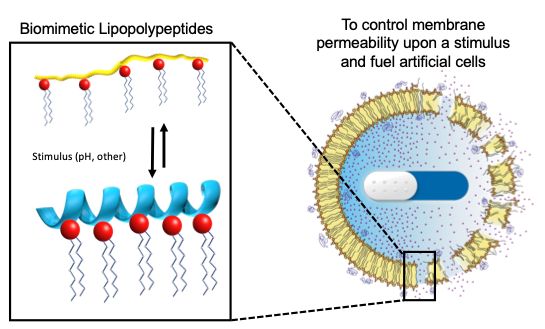PhD Position in Chemistry and Technology for Health
Project title. Responsive lipopolypeptides to control cell membrane permeation
Starting Date. October 1st, 2022 (3 years)
Keywords. Molecular tweezers synthesis, biomimetic copolymers, lipid nanoparticles, stimuli-responsive systems, artificial proteins
Project description.
Building a minimal synthetic cell requires firstly a vesicle to delineate and compartmentalize the artificial system, and secondly a controlled transport mechanism to fuel the cell in nutrients (ions, amino acids, ATP, etc). This project is aimed at engineering synthetic lipopolypeptides to mimic membrane protein transporters. These lipopolymers will be able to anchor in artificial or natural cell membrane and to control its permeation via the application of external stimuli (pH, ions, etc.). Compared to natural proteins, these synthetic transporters will be more robust, but they will also keep the responsiveness and the reversibility of the natural models.
In an initial stage, we will design and synthesize lipids based on molecular tweezers responsive to pH and ions (Ca2+, Zn2+, etc.). Then, a series of polypeptide-lipid conjugates will be synthesized using ring-opening polymerization to promote tweezers multivalency and provide additional conformational switch. Finally, these conjugates will be incorporated into lipid vesicles (liposomes or cells). Their responsive behavior will be investigated by the controlled diffusion of species in response to ionic stimulus, looking especially to the sustainability of the process.
Supervision and environment. The candidate will be co-supervised by Dr Jeanne Leblond Chain (INSERM Senior researcher, ARNA U1212) and Dr Colin Bonduelle (CNRS Senior researcher, LCPO UMR5629). Both teams aim at developing bioinspired systems by conjugating responsive lipids and biomimetic polymers. The lipid synthesis and formulation of responsive nanoparticles are the expertise of Dr Leblond Chain. Polymeric synthesis and self-assembly properties are the expertise of Dr Bonduelle. This project is funded by the Innovative Research Network “Frontiers of Life” of University of Bordeaux, which gathers experts around bioinspired systems to build artificial cells. The PhD candidate will be involved in this newly created network, especially its specific scientific animation (workshops, conferences, summer schools).

Candidate profile. The PhD candidate should have a solid background in organic chemistry and/or polymer chemistry. Skills in physical chemistry and nanomaterial characterization would be appreciated.
Contact. Please send your CV, grade record (Master 1+ Master 2), motivation letter and 2 reference names/letters to jeanne.leblond-chain@inserm.fr and colin.bonduelle@cnrs.fr before May 15th, 2022.


